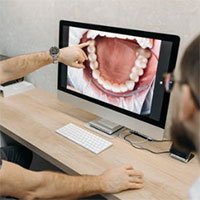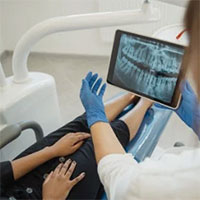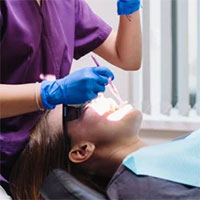
Over the past 15 years, dentistry has seen a major sociological change requiring a different kind of education outside the typical Dental School and Medical School curriculum. That sociological change is the number of Baby Boomers in our population. In Canada and the United States there are approximately 80 million Baby Boomers whose dental healthcare needs are significantly different from their parents' generation, for one simple reason:
Baby Boomers still have their teeth, while their parents had dentures.
Providing dental services for "older teeth" that are 50, 60 or 70 years old is significantly different from providing treatment for "younger teeth" that are only 20 or 30 years old. In fact, most of the methods now being used for keeping "older" teeth" healthy for today's vibrant Baby Boomer patient weren't even invented thirty years ago. This is the reason why there's a need to specifically obtain a different type of Dental Education, on behalf of these 80 million patients. In a proverbial nutshell, what has changed is that:
The dental profession had never seen the problems now facing Baby Boomer teeth, because the generation before the Baby Boomers had false teeth.
As we age, our teeth age and these age-related changes require a different approach to diagnosis, treatment planning and dental services. At Veritas Dental we have re-directed our focus to meet the needs of our more mature patients with respect to our post-doctoral continuing education.
By focusing our continuing educational efforts in addressing the specific needs of Baby Boomers and Seniors, this enables Veritas Dental to provide our patients with the kinds of solutions that their parents never would have experienced (nor needed).

Baby Boomers and other Seniors also have another specific need that dentistry never had to address thirty years ago. This is the need for greater patient education. The sociological reason behind this increased need to focus on a higher level of patient education is three-pronged:
To holistically serve this growing need for information, Doctors are seeing patients ask questions patients never would have asked in previous years. This means the needs of patients has created a new requirement for Doctors to change their provision of healthcare services in one very important criteria:
Time.
Patients are wanting more time to ask their Doctors questions. They want to get answers to their questions and get those answers in a language that makes sense to them (not in medical jargon). In years past, patients would never "question" a Doctor, they would simply accept whatever a Doctor recommended because patients were in the dark as to the medical principles of diagnosis, treatment planning, different options and in many cases, different costs associated with the different options.
At Veritas Dental, we have made accommodations for this need for patient education. In accordance with our patients' wishes, we provide additional time at appointments to answer questions, to the best of our ability, in terms that make sense to our patients.
We call this the How, What and Why approach to holistic care.

At Veritas Dental our goal is to create a healthcare experience in a culture of collaboration between our patients and every member of the clinical team. Think of this goal as a "Standard of Care" that we believe in, we aspire to and that we hope to tangibly manifest for each and every patient. This standard is comprised of eight different patient-centered statements, or eight different "Ethos" related to building a bond of faith and trust. It is "how" we aspire to serve our patients, not just as "physically" as physical health services providers, but also from a social perspective in order to be health*care* providers that will address our patients' holistic needs, mentally, emotionally, as well as spiritually.
The very first of these Ethos statements is as follows:
We are committed to explaining to those we serve what needs to be done, how we will do it and most importantly, why it needs to be done.
To accomplish this goal, we have to go beyond just answering questions, we have to actively encourage questions. To meet our aspirations of building a bond of faith and trust with our patients, we have to take the time to explain things in language that makes sense, even if that requires us to create different types of word pictures to satisfy the questions of different kinds of patients with different kinds of experiences, be that culturally, demographically or vocationally. In our attempts to ensure we are properly answering your questions, and answering them to your personal satisfaction, you will hear us ask this question:
"Did that make sense to you?"
We don't ask this question because we are concerned our patients didn't understand *our* language, we ask that question because we are concerned that we didn't properly communicate the information our patient is wanting and needing to receive, so they can make the best choices for their personal healthcare.
At the end of every appointment, we ask our patients to assess the levels for which we did (or did not) achieve the goals and aspirations of our Ethos. In other words, we "actively seek correction" to ensure that our standard is not just a set of words painted on our reception room wall, but that we are meeting those eight ethos statements according to what our patients think, not according to what we think.
To view these eight Ethos statements, click the button below:
Got questions? Please call , send an e-mail to smile@veritasdental.ca, or fill-out our contact form to discuss your needs.
Whenever possible, we will see our patients on a same day basis should they be suffering from dental pain. We are closed on Sunday except for emergencies.